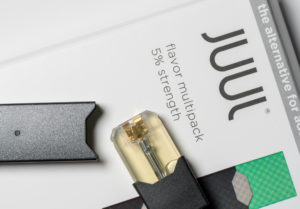Juul Labs Inc. has accused several gas station marts of selling “grey market” and counterfeit versions of its e-cigarettes and has demanded up to $2 million for each trademark infringement.

The San Francisco company has sued 11 convenience stores so far this month in federal courts in White Plains, Manhattan, Newark, New Jersey and Hartford, Connecticut.
“Juul products have become targets for individuals and entities who … wish to take a ‘free ride’ on the commercial success of the Juul brand,” one such lawsuit states, “by illegally manufacturing, selling and distributing fake, copied and non-genuine versions of Juul products and related packaging.”
Juul representatives bought alleged counterfeits at gas station marts in Brewster, Cortlandt Manor, Fishkill, Kingston, Newburgh, New Paltz, Poughkeepsie and Saugerties in New York; Rocky Hill and Avon in Connecticut; and Montvale, New Jersey.
Last August, for instance, a Juul operative bought the devices at a Shell gas station convenience store in Poughkeepsie, according to an April 7 complaint filed in U.S. District Court, White Plains.
All of the businesses where Juul bought the devices are owned by the same individuals, according to the complaint, but the individuals are not identified.
The defendant in the Poughkeepsie case is Baldwin Snack Shop Inc., which is run by Ibrahim Jamal, according to a state corporation record. Members of the Jamal family operate hundreds of gas stations and convenience stores in the Northeast, under Chestnut Mart and CPD Energy Corp., New Paltz.
Efforts to contact the company for its side of the story failed.
The devices bought at the gas station marts had not undergone the company’s stringent quality controls, according to the Baldwin complaint, and use “unknown substances and materials.” Warning labels were in languages other than English and did not comply with U.S. Food and Drug Administration regulations.

The packaging allegedly included “confusingly similar imitations” of Juul trademarked logos.
Juul issued a cease and desist order to Baldwin Snack Shop last August, according to the complaint, but received no response.
Juul charged Baldwin with trademark infringement for selling goods that are designed to deceive consumers into believing they are genuine Juul products; unfair competition that has resulted in lost sales and profits; and deceptive acts and practices.
It is demanding an injunction to stop the store from continuing to sell counterfeit devices and an accounting of ill-gotten gains obtained from illegal sales. It is asking for a court order to seize and destroy the products, accessories, labels, signs, packages and marketing materials.
Juul is represented by Boston attorney Terry Parker and Fullerton, California attorney Randall J. Clement.




















